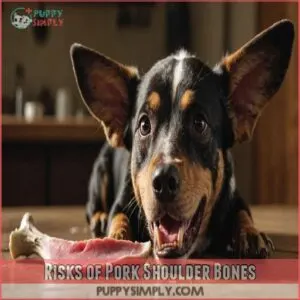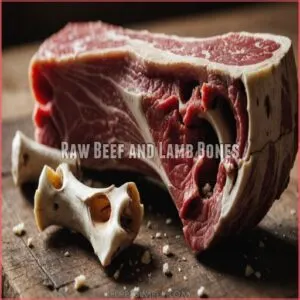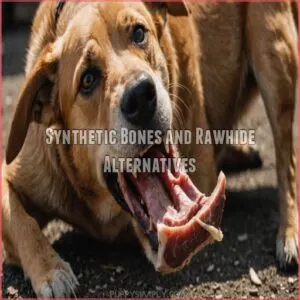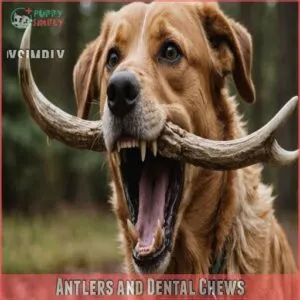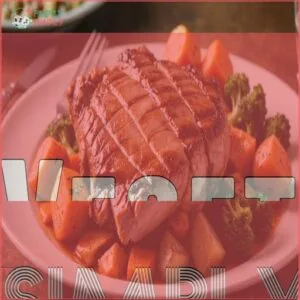This site is supported by our readers. We may earn a commission, at no cost to you, if you purchase through links.
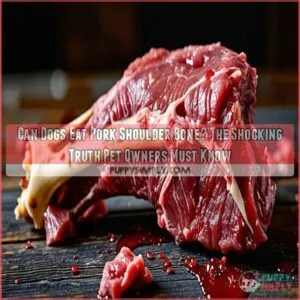
While dogs can technically eat raw pork shoulder bones, it’s not always a walk in the park.
These bones can be a real pain in the neck, posing choking hazards and risking intestinal damage.
They’re like a double-edged sword – tempting but treacherous.
Cooked bones are an absolute no-no, as they splinter easily.
Raw bones can harbor bacteria, potentially leading to tummy troubles.
Your pup’s pearly whites aren’t indestructible either; hard bones can crack teeth faster than you can say "fetch."
But don’t worry, there are safer alternatives that’ll have your furry friend wagging their tail in no time.
Table Of Contents
Key Takeaways
- Don’t give your dog pork shoulder bones – they pose serious risks like choking, intestinal damage, and bacterial contamination.
- Raw bones are slightly safer than cooked ones, but they still carry significant dangers and aren’t recommended.
- Consider safer alternatives like raw beef or lamb bones, synthetic chews, antlers, or veggie chew toys.
- If you must give bones, do so sparingly (1-2 times per week max), always supervise, and watch for signs of digestive trouble.
Risks of Pork Shoulder Bones
You might think pork shoulder bones are a tasty treat for your furry friend, but they can be risky.
These bones can splinter, causing choking or internal injuries, and may harbor harmful bacteria that could upset your dog’s stomach.
Choking Hazards and Intestinal Damage
A bone in the throat isn’t just a figure of speech for dogs.
Pork shoulder bones can be a real pain in the neck—literally.
They’re often too small for larger breeds, increasing the risk of choking.
And if swallowed, these bones can cause serious intestinal damage.
Here’s what you need to know:
- Bone size matters: Choose bones larger than your dog’s muzzle
- Shape counts: Avoid bones with sharp edges
- Consider your dog’s breed and chew strength
- Always supervise chewing sessions
- Watch for signs of distress, like gagging or vomiting
Brittle Bones and Splintering
Let’s talk about another hidden danger: brittle bones and splintering.
You might think a pork shoulder bone is a tasty treat for your pup, but it’s like giving them a ticking time bomb.
Cooked bones become brittle and can splinter into sharp shards.
These nasty splinters can scratch your dog’s throat or puncture their digestive tract.
It’s just not worth the risk, folks.
Stick to safer chew options to keep your furry friend out of harm’s way.
Bacterial Contamination and Digestive Issues
Pork shoulder bones aren’t just a splintering hazard; they’re also a breeding ground for harmful bacteria.
Opting for safer dog bone alternatives can be a great way to minimize these risks.
Your furry friend’s tummy might take a hit from Salmonella risks causing upset stomachs E. coli concerns leading to severe diarrhea * Bone fragments potentially causing
Dental Damage and Fractured Jaws
While bacteria lurk on pork bones, your dog’s teeth aren’t off the hook either.
The dangers of bone ingestion go beyond dental issues, as pork bones can splinter, causing punctures or blockages in the digestive tract.
Those seemingly innocent bones can pack a punch to your pup’s pearly whites.
Imagine your furry friend’s jaw strength meeting a bone that’s
Safe Alternatives to Pork Shoulder Bones
You don’t have to give up on treating your furry friend just because pork shoulder bones are off the menu.
There are plenty of safe alternatives that’ll keep your dog’s tail wagging, from raw beef bones to synthetic chews designed for canine chompers.
Raw Beef and Lamb Bones
Beef and lamb bones offer a safer chew for your furry friend.
Raw bones have higher density and nutritional value, making them ideal for dogs.
They’re less likely to splinter, reducing choking hazards and intestinal damage risks.
Here’s what you need to know:
- Choose bones sized for your dog’s breed
- Avoid cooked bones – they’re brittle and dangerous
- Supervise chewing sessions for safety
- Refrigerate or freeze raw bones between uses
Remember, every dog is different.
Consult your vet for personalized advice on bone safety.
Synthetic Bones and Rawhide Alternatives
Synthetic bones and rawhide alternatives offer a safer chewing experience for your pup.
For extra peace of mind, consider exploring durable dog chews designed to withstand aggressive chewers.
These options prioritize durability and safety, reducing the risk of choking hazards or intestinal damage associated with pork shoulder bones.
You’ll find a variety of textures and shapes to suit your dog’s preferences.
Antlers and Dental Chews
For a safer chew that’ll make your pup’s tail wag, consider antlers and dental chews.
These alternatives are tough cookies that last longer than pork shoulder bones.
Antlers are nature’s toothbrush, scraping away plaque while satisfying your dog’s urge to gnaw.
Dental chews come in various flavors and sizes, keeping those pearly whites clean.
Remember, always supervise your furry friend during chew time to prevent any choking mishaps.
Veget
Craving a bone-free alternative for your pup? Try veggie chew toys! These healthy veggie options are safe and tasty treats.
Carrots make great raw veggie bones, satisfying your dog’s urge to chew without the risks. You’ll find plenty of veggie dog treats at pet stores too.
Remember, while these alternatives are safer than pork shoulder bones, always supervise your furry friend during chew time to prevent choking hazards or intestinal blockages.
Frequently Asked Questions (FAQs)
How often can I give my dog bones?
Want to treat your pup? Hold your horses! You shouldn’t give your dog bones daily.
Offer them once or twice a week max. Too many can cause digestive issues.
Always supervise and choose safe, size-appropriate options.
Are raw pork shoulder bones safer than cooked ones?
Raw pork shoulder bones are indeed safer than cooked ones for your dog.
They’re less likely to splinter, reducing choking and injury risks.
However, they still pose potential hazards.
Always supervise and consider safer alternatives for your pup’s chewing needs.
Can puppies chew on pork shoulder bones?
It’s best to avoid giving puppies pork shoulder bones.
Their teeth and digestive systems are still developing, making them more susceptible to choking and intestinal damage.
Stick to puppy-safe chew toys and treats recommended by your vet instead.
What signs indicate a dog is having trouble digesting bones?
While some might think it’s normal, watch for these red flags: vomiting, constipation, or bloody stool.
Your dog may also show signs of discomfort, like whining or restlessness.
If you spot these, it’s time to call the vet.
How do I properly clean and store pork shoulder bones?
Clean pork shoulder bones by rinsing them thoroughly under cold water.
Remove any visible meat or fat.
Pat dry with paper towels.
Store in airtight containers or freezer bags in the refrigerator for up to 3-4 days, or freeze for longer storage.
Conclusion
Imagine this: your dog’s health hanging by a thread, all because of a pork shoulder bone.
It’s clear that these bones are more trouble than they’re worth.
While dogs might love gnawing on them, the risks far outweigh any benefits.
From choking hazards to dental disasters, it’s just not worth the gamble.
Instead, opt for safer alternatives that’ll keep your pup happy and healthy.
Remember, regarding the question "can dogs eat pork shoulder bone," the answer is a resounding no.
Your furry friend’s wellbeing always comes first.
- https://www.akc.org/expert-advice/health/general-health/what-to-do-dog-eats-chicken-bone/
- https://www.petmd.com/dog/nutrition/how-use-bones-raw-dog-food-diet
- https://www.caninejournal.com/can-dogs-eat-bones/
- https://petcareadvisors.com/dogs/can-dogs-eat-pork-shoulder-bones/
- https://dogcarelife.com/can-dogs-eat-a-pork-shoulder-bone-its-much-safer-served-raw/

